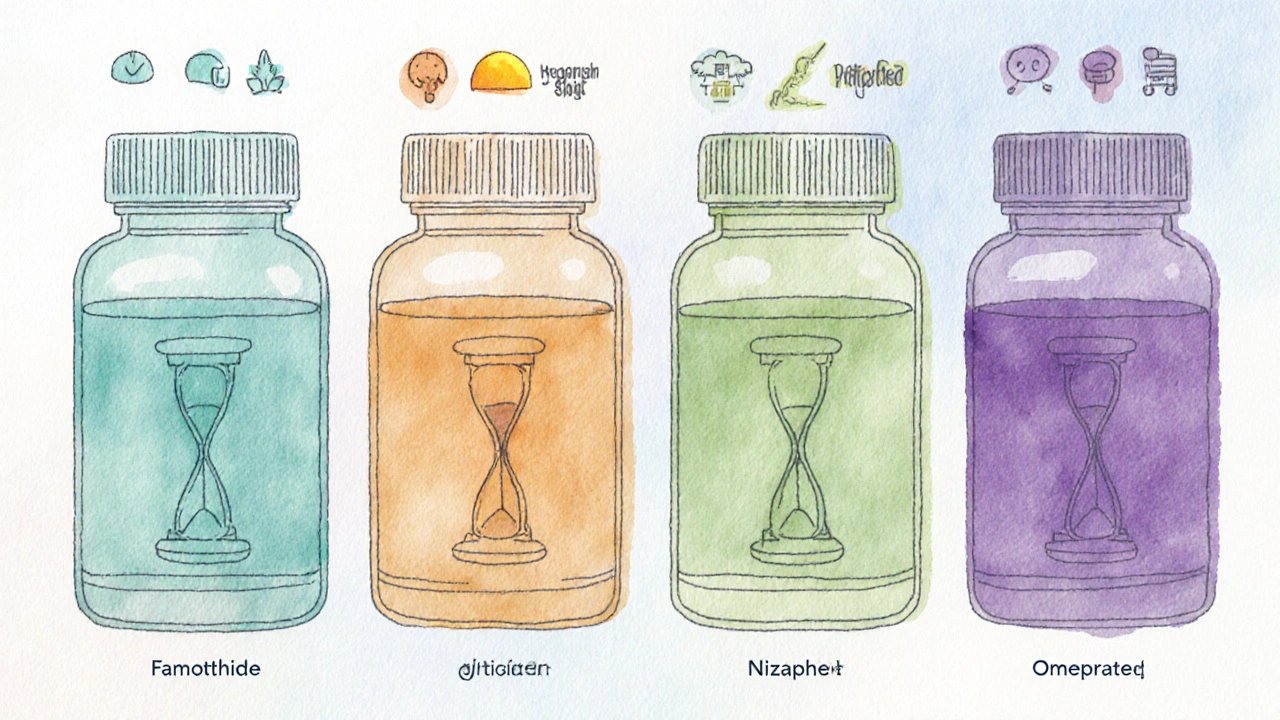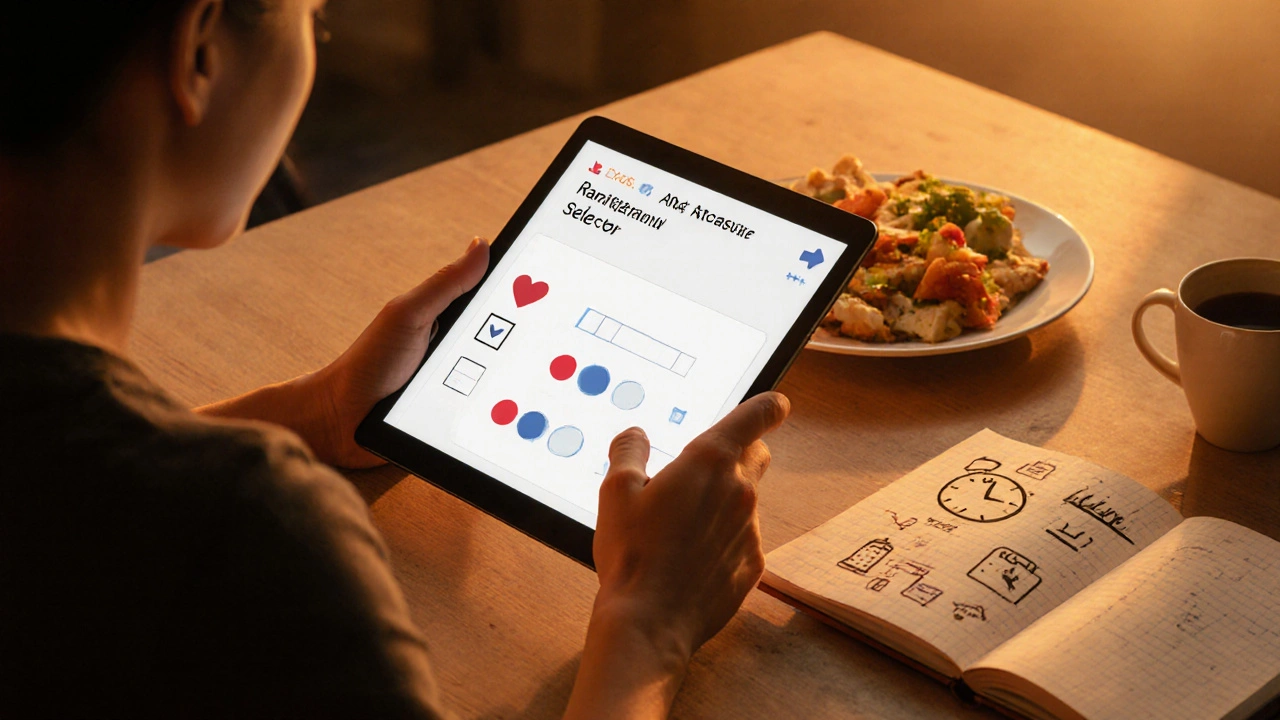 Oct, 4 2025
Oct, 4 2025
Ranitidine Alternative Selector
Recommended Alternative
Quick Takeaways
- Ranitidine was pulled from shelves worldwide after NDMA contamination was discovered.
- Famotidine and Cimetidine are the closest H2‑blocker substitutes; they work similarly but have different dosing and side‑effect profiles.
- Proton‑pump inhibitors like Omeprazole provide stronger acid control but may not be needed for mild symptoms.
- When switching, keep an eye on timing, dosage equivalents, and any existing health conditions.
- Always discuss changes with a healthcare professional, especially if you have liver disease, kidney issues, or take multiple drugs.
When the news broke that Ranitidine a popular over‑the‑counter heart‑burn reliever, was withdrawn from the market due to a carcinogenic impurity, many people wondered what they should take instead. The drug belonged to the histamine H2‑receptor blocker class, a group that slows stomach acid production without the potency of modern proton‑pump inhibitors (PPIs). In this guide we break down the story behind the recall, compare the most common alternatives, and give you a roadmap for picking the right one for your tummy troubles.
What Is Ranitidine?
Ranitidine was marketed under brand names like Zantac and was available in 75mg and 150mg tablets, as well as chewable and liquid forms. It lowered stomach acid by blocking the H2 receptors on gastric parietal cells, which in turn reduced symptoms of heartburn, gastroesophageal reflux disease (GERD), and even helped heal mild ulcers.
Typical dosing for adults ranged from 150mg twice daily to 300mg once daily, depending on the condition and severity. Because it acted faster than most PPIs (often within an hour) and lasted around 12hours, many users liked it for on‑demand relief.
Why Was Ranitidine Pulled?
In 2019, trace amounts of N‑nitrosodimethylamine (NDMA), a known probable human carcinogen, were detected in some ranitidine batches. Subsequent testing showed that the drug could form NDMA over time, especially when stored at higher temperatures. The U.S. Food and Drug Administration (FDA) and health agencies worldwide issued recalls in 2020, and by early 2021 most manufacturers stopped production.
The FDA’s statement warned that "long‑term exposure to NDMA at levels above the acceptable daily intake could increase the risk of cancer." This warning prompted patients and doctors to look for safer equivalents.

Alternatives at a Glance
Below are the most common over‑the‑counter options you’ll encounter. Each belongs to a slightly different pharmacological family, which means they vary in potency, onset, and side‑effect risk.
- Famotidine another H2‑blocker, sold as Pepcid
- Cimetidine the oldest H2‑blocker, known as Tagamet
- Nizatidine a less‑common H2‑blocker, marketed as Axid
- Omeprazole a proton‑pump inhibitor (PPI) that provides stronger acid suppression
Side‑by‑Side Comparison
| Attribute | Ranitidine (withdrawn) | Famotidine | Cimetidine | Nizatidine | Omeprazole (PPI) |
|---|---|---|---|---|---|
| Drug class | H2‑receptor blocker | H2‑receptor blocker | H2‑receptor blocker | H2‑receptor blocker | Proton‑pump inhibitor |
| Typical OTC dose (adult) | 150mgBID or 300mgQD | 20mgBID or 40mgQD | 200mgBID | 150mgQD | 20mgQD (delayed‑release) |
| Onset of relief | ~1hour | ~30minutes | ~1hour | ~45minutes | 2-4hours |
| Duration of effect | 12hours | 10-12hours | 12hours | 12hours | 24hours |
| Common side effects | Headache, dizziness | Headache, constipation | Gynecomastia, taste changes | Diarrhea, nausea | Diarrhea, abdominal pain |
| NDMA risk | Detected in some batches (withdrawn) | None reported | None reported | None reported | None reported |
| Availability (2025) | Off‑market | OTC, pharmacies, supermarkets | OTC, limited to pharmacies | Prescription‑only in most regions | OTC (low dose) and prescription strong dose |
How to Pick the Best Option for You
Choosing an alternative isn’t a one‑size‑fits‑all decision. Think about three practical factors:
- Severity of symptoms. If you only get occasional heartburn after a big meal, a fast‑acting H2‑blocker like famotidine works well. For chronic GERD that flares nightly, a PPI such as omeprazole offers longer protection.
- Underlying health conditions. Cimetidine can interact with drugs metabolized by the cytochromeP450 system, so it’s best avoided if you’re on blood thinners or certain antidepressants. Famotidine has the cleanest interaction profile.
- How quickly you need relief. Famotidine’s 30‑minute onset makes it handy for on‑the‑spot heartburn, whereas omeprazole needs a few days of consistent dosing to reach full effect.
For most people who used ranitidine for mild‑to‑moderate heartburn, switching to famotidine 20mg twice a day is the simplest swap. If you have a history of ulcers or severe reflux, ask your doctor whether a short course of a PPI is more appropriate.
Practical Tips for Switching
- Match the timing. Take the new H2‑blocker with or without food, just as you did with ranitidine. For PPIs, take them 30minutes before breakfast.
- Watch for overlap. Don’t double‑dose. If you’ve already taken a ranitidine tablet, wait at least 4hours before the first dose of the new drug.
- Monitor side effects. New symptoms like persistent headache, dark urine, or unexplained weight loss should prompt a call to your clinician.
- Adjust for kidney function. Older adults or those with reduced renal clearance may need lower famotidine doses (e.g., 10mg daily).
- Keep a symptom diary. Jot down when you take the medication, what you ate, and how you felt. A two‑week log helps your doctor fine‑tune the regimen.

Frequently Asked Questions
Can I still buy ranitidine online?
Most reputable pharmacies have removed it from their inventories. Some overseas sellers list it, but the risk of NDMA contamination remains high, so health authorities advise against purchasing it.
Is famotidine as safe as the old ranitidine?
Yes. Famotidine has a clean safety record and no reported NDMA issues. Its side‑effect profile is mild, and it doesn’t interfere with most other medications.
What’s the main difference between H2‑blockers and PPIs?
H2‑blockers stop histamine from stimulating acid‑producing cells, leading to moderate, short‑term acid reduction. PPIs block the final step of acid production, giving a stronger and longer-lasting drop in stomach acidity.
Can I take a PPI for a few days and then switch back to an H2‑blocker?
That’s a common strategy. A short PPI course can heal inflamed esophagus, after which an H2‑blocker can maintain relief. Always discuss the plan with a healthcare provider.
Are there any natural alternatives to ranitidine?
Lifestyle tweaks-like avoiding trigger foods, eating smaller meals, and elevating the head of the bed-can reduce heartburn. Herbal remedies such as ginger tea or deglycyrrhizinated licorice (DGL) have modest evidence, but they’re not a replacement for medication in severe cases.
Bottom line: the ranitidine recall has nudged many of us toward safer, equally effective options. Whether you settle on famotidine for quick relief or step up to a PPI for chronic control, the key is to match the drug to your symptom pattern and health background. Keep an eye on dosage, watch for side effects, and stay in touch with a medical professional-you’ll be back to feeling good without the worry of hidden carcinogens.

Mark Eaton
October 4, 2025 AT 14:16Switching to famotidine is a quick win for most heartburn sufferers.
Alfred Benton
October 7, 2025 AT 11:43The withdrawal of ranitidine was not a mere bureaucratic hiccup but a deliberate concealment of a carcinogenic threat that has plagued the pharmaceutical industry for decades. Documents leaked from regulatory agencies show that manufacturers were aware of NDMA formation long before the public scare. The timing of the recall coincides suspiciously with market pressures to push newer, more profitable drugs. This pattern mirrors previous instances where harmful compounds were downplayed to protect profit margins. Consequently, consumers should remain vigilant about the hidden chemicals in over‑the‑counter medications.
Susan Cobb
October 10, 2025 AT 09:09When evaluating alternatives to ranitidine, the first point to consider is the pharmacodynamic profile of each H2‑blocker. Famotidine, for instance, binds with greater affinity to the H2 receptor, resulting in a more pronounced and sustained reduction in gastric acid secretion. This translates into faster symptomatic relief, typically within 30 minutes, and a duration that can last up to 12 hours, making it suitable for both intermittent and chronic use. Cimetidine, while historically significant, suffers from a higher incidence of drug‑drug interactions due to its inhibition of the cytochrome P450 system; clinicians often avoid it in polypharmacy patients. Nizatidine, though less common, offers a comparable efficacy to famotidine with a slightly longer onset time, making it a viable secondary option when famotidine is unavailable.
Moving beyond H2‑blockers, proton‑pump inhibitors such as omeprazole provide a fundamentally different mechanism by irreversibly inhibiting the H+/K+ ATPase pump. This leads to a more profound acid suppression, often required for severe GERD, erosive esophagitis, or Zollinger‑Ellison syndrome. However, PPIs are associated with long‑term risks, including nutrient malabsorption, increased susceptibility to infections, and potential renal complications, which necessitates periodic reassessment of therapy.
From a safety perspective, the absence of NDMA formation in famotidine and cimetidine is a critical advantage. While the FDA has not identified any carcinogenic contaminants in these agents, ongoing surveillance remains essential, especially given the evolving standards for acceptable impurity thresholds. Patients with renal impairment should note that famotidine dosing must be adjusted, typically halving the dose for moderate dysfunction and further reducing for severe cases.
Pharmacoeconomics also play a role in selection. Famotidine is widely available as an inexpensive generic, whereas newer PPIs may carry higher out‑of‑pocket costs, influencing adherence. Insurance formularies frequently favor H2‑blockers as first‑line agents before escalating to PPIs, reflecting both cost‑effectiveness and clinical guidelines.
In summary, the decision matrix for replacing ranitidine should incorporate symptom severity, comorbid conditions, drug interaction potential, and patient preference. For mild to moderate heartburn, famotidine 20 mg twice daily offers an optimal balance of efficacy, safety, and convenience. In cases of refractory or severe disease, a short course of a PPI may be warranted, followed by step‑down to an H2‑blocker for maintenance. Continuous dialogue with a healthcare provider ensures that therapy remains tailored to the individual’s evolving clinical picture.
Ivy Himnika
October 13, 2025 AT 06:36While the extensive comparison you provided is thorough, it is also essential to address the practical aspects of daily dosing.
Patients often wonder whether taking famotidine with food alters its absorption, and the answer is that it can be taken with or without meals without compromising efficacy. Additionally, remember to store H2‑blockers in a cool, dry place to prevent any potential degradation.
👍
Nicole Tillman
October 16, 2025 AT 04:03From a balanced perspective, the key is to match the drug’s pharmacology with the patient’s lifestyle.
Jason Ring
October 19, 2025 AT 01:29yeah i think the timing thing is realy important if u take famotidine after a big meal it might not work as fast so try to take it before.
Kelly Hale
October 21, 2025 AT 22:56Our nation’s health cannot be entrusted to imported pharmaceutical conspiracies that seek to undermine American well‑being! The recall of ranitidine is yet another example of foreign actors poisoning our citizens under the guise of safety. Only a home‑grown solution, rigorously vetted by patriotic scientists, can safeguard our digestive health. We must demand that FDA adopt the highest standards, free from globalist influence, to protect the great American gut! Let us rally for domestic production of proven H2‑blockers and reject any foreign compound that threatens our vital constitution.
Neviah Abrahams
October 24, 2025 AT 20:23the drug market is a mess its full of shady deals and hidden risks people need to be aware of the FDA is just a puppet for big pharma stop trusting the headlines start doing your own research
Uju Okonkwo
October 27, 2025 AT 16:49It’s wonderful to see a community sharing knowledge about safer alternatives. If anyone is unsure about dosing adjustments for kidney disease, feel free to ask-we can look up the latest guidelines together.
allen doroteo
October 30, 2025 AT 14:16i think the whole famotidine hype is overblown its not a magic bullet. some ppl just need lifestyle changes like avoiding spicy foods and not lying down after meals. also i read that cimetidine can cause weird hair loss in some cases, so maybe famotidine isn’t always the best choice.
Corey Jost
November 2, 2025 AT 11:43While many celebrate the shift away from ranitidine, it’s worth questioning whether we’re simply swapping one imperfect solution for another without addressing the root causes of reflux. Diet, stress, and sleep patterns play pivotal roles, yet the discourse remains fixated on pharmacology. Moreover, the industry’s swift promotion of famotidine and PPIs raises concerns about profit motives eclipsing patient empowerment. Shouldn’t we be demanding more transparent research data rather than accepting marketing narratives at face value? In short, a holistic approach might serve us better than a perpetual reliance on pills.
Nick Ward
November 5, 2025 AT 09:09Great points, Corey! 🙌 It’s true that lifestyle tweaks can make a huge difference alongside medication.
Thanks for sharing your thoughts.
felix rochas
November 8, 2025 AT 06:36Let me be crystal clear: the entire pharmaceutical narrative surrounding ranitidine’s withdrawal is a staged operation designed to shift consumer trust toward newer, more profitable compounds, such as PPIs, which have their own undisclosed side‑effects, and the data released by "authoritative" bodies is heavily redacted, showing a pattern of manipulation that cannot be ignored, especially when considering the hidden financial incentives driving these decisions, which raises serious ethical concerns about the transparency and accountability of the agencies involved.
inder kahlon
November 11, 2025 AT 04:03Felix, the concerns you raise highlight the need for independent research. Transparency is key.
Patients benefit when they have access to unbiased data.
Dheeraj Mehta
November 14, 2025 AT 01:29Stay positive, everyone! 😊 A balanced approach with the right medication and lifestyle tweaks can keep heartburn at bay.